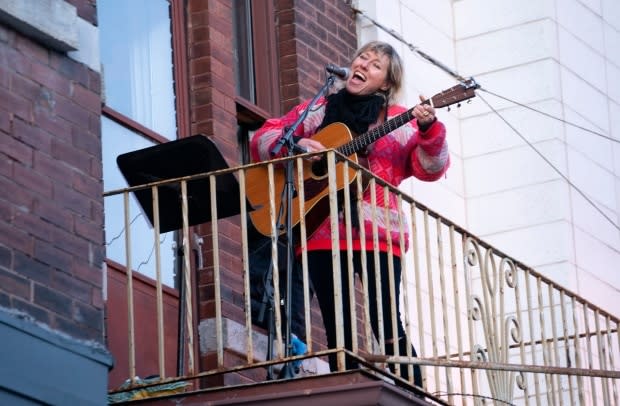COVID-19 in Quebec: Staying away from seniors' homes a matter of 'life or death,' Legault says

More than 500 long-term care facilities in the province have reported at least one confirmed case.
Premier François Legault is urging Quebecers to follow the restrictions in place meant to guard against further spread of COVID-19, especially to vulnerable seniors.
In his briefing Wednesday, Legault called on Quebecers to stay away from seniors' homes and all long-term care institutions.
"We must continue to protect our elderly population. There must be no visits in the residences. It's a question of life or death," he said.
The province prohibited all visits to long-term care homes on March 14, but since then, at least one person in 519 such facilities across the province has tested positive for the novel coronavirus.
Legault said there are now a total of 4,611 confirmed COVID-19 cases in the province, up from 4,162 a day earlier.
That increase of 449 cases represents an 11 per cent rise in the number of confirmed cases in the past 24 hours, which is below the trajectory seen in recent days.
A total of 33 deaths are now attributed to the virus in the province, up two from Tuesday.
There are 307 infected people in hospital. Of those, 82 are in intensive care — the same number as there were Tuesday.
After highlighting the shortage of supplies of protective equipment yesterday, Legault said Wednesday the province had received new shipments and that they would be enough for the week.
Legault also said several Quebec companies are starting to manufacture the supplies as well.
No plans to close Montreal
Despite the high number of cases on the island of Montreal, Legault said there are no plans to prohibit movement to and from the city.
He said if an island-wide travel ban were to be imposed, the province would also have to restrict access to the off-island suburbs, such as Longueuil and Laval.
"If we decided one day to do that, we would need also to close the suburbs because [from] north and south of the island of Montreal, there's a lot of travelling," he said.
Mayor Valérie Plante has said she wanted the measures the city takes to be gradual and not impede on people's personal freedoms, as much as possible.
On Wednesday, Plante urged Montrealers not to gather in public parks as the weather warms.
She said the city may be forced to close parks if the rules, including a ban on gatherings of two or more people, aren't respected.
Legault, for his part, said that "would be good idea if we keep on seeing groups in those parks."
New travel restrictions in regions
Quebec also announced additional travel restrictions on Wednesday.
The latest measure covers the Outaouais region near Ottawa, regional municipalities and counties in the Laurentians and the Lanaudière regions and the city of La Tuque in the Mauricie region.
While there won't be physical police checkpoints, public health authorities said officers on patrol will be randomly stopping people to make sure they meet the criteria for essential travel.
Unless people are headed to a medical appointment, getting food, providing care or delivering goods to someone who can't go out, they will be asked to return home.
Legault said the measures are meant to prevent regions where there has been little spread from being exposed.
"We must continue to follow our three priorities: don't go out unless it's necessary. If you do go out, keep your distances. And when you come back home, wash your hands," he said.
The announcement comes after eight "vulnerable regions" in Quebec saw police checkpoints put in place on Saturday with the mandate to refuse all non-essential travel.
United by music

On a brighter note, musician Martha Wainwright led another sing-along Tuesday night.
The event was the second in an series co-organized by POP Montreal and Wainwright's Mile End café and music venue, Ursa.
"The idea was to get a little bit closer to the city and to our neighbours and to really share our music, which is so essential," Wainwright said.
Inspired by similar initiatives in Italy and around the world, the goal is to encourage people to head out onto their balconies or porches, or crack open their windows and sing along to music performed by a local musician.


